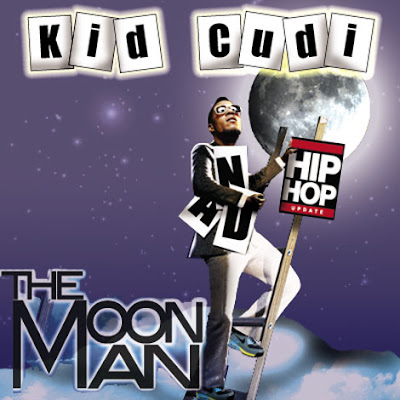
While Kid Cudi’s debut is definitely impressive, it hits a number of snags. One big thing is Common’s completely unnecessary narration, which appears at random. It’s as though Mescudi feared that the unity among the tracks as far as the production and lyrics were concerned wasn’t enough to make the album feel conceptual, so lines for a narrator were tacked on between certain songs. It doesn’t flow, and doesn’t feel genuine; it only serves to disrupt Man on the Moon’s momentum. Speaking of flow, another issue is that Kid Cudi barely has one. This isn’t exactly crippling, as the vocal patterns are very well constructed, but his voice is caught awkwardly betwixt singing, rapping, and talking voices, not really registering as any of these. Lyrically, while Mescudi certainly can’t be accused of being empty or bereft of feeling, as there’s a lot of that here, more often than not he sacrifices any sense of poetry for directness to the point of coming across as self pitying.

Man on the Moon fumbles a bit at the end with the generic slow jam sound of Hyyerr as well as Common popping up once more to conclude his narration, but the album doesn’t quite end on a sour note. Kid Cudi is able to largely live up to the hype that has surrounded him for the past year, and his interesting perspectives on the genre will no doubt yield even better works in the future.
The End Of Day, Make Her Say
After gaining acclaim with his first single following the success of his mix tape, Kid Cudi worked with Kanye West on his 2008 album, 808s & Heartbreak.
West returns the favor on follow up single “Make Her Say”, originally titled “I Poke Her Face”. Fusing samples from Lady Gaga's “Poker Face” and featuring performances by Common and West, it may be the equivalent of locker room banter poured on vinyl, but shows creativity and a spark (however dim) of brightness on an overall dark record.
Ratatat-produced third single "Pursuit Of Happiness", featuring vocals by MGMT and, though not the first two collaborators one would think of to work with an emerging rap artist, together they provide a solid performance and another album savior.
Stepping out of his comfort zone on this track, Cudi faces his unnamed demons and asks profound questions while a space-age soundscape swallows the track before MGMT burst in on the chorus. Pure genius.
Read more at Suite101: Kid Cudi Man On The Moon: The End Of Day: Review of CD from Kanye West Protégé with Day ' Nite & Make Her Say http://electro-music.suite101.com/article.cfm/kid_cudi_man_on_the_moon_the_end_of_day#ixzz0v6thHpZ5



